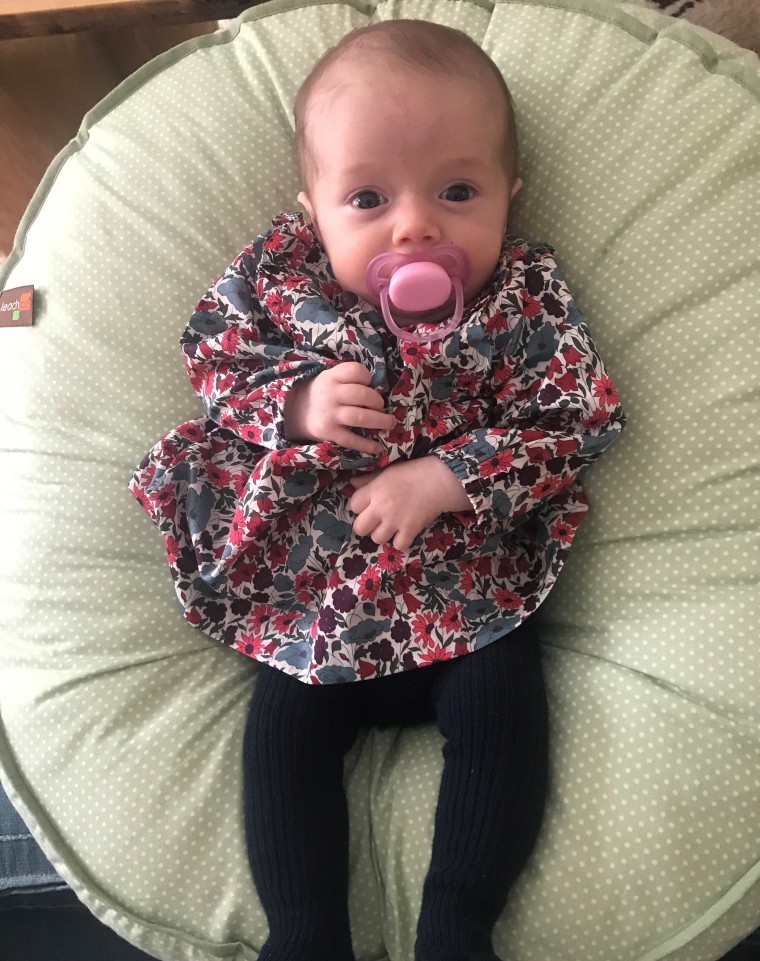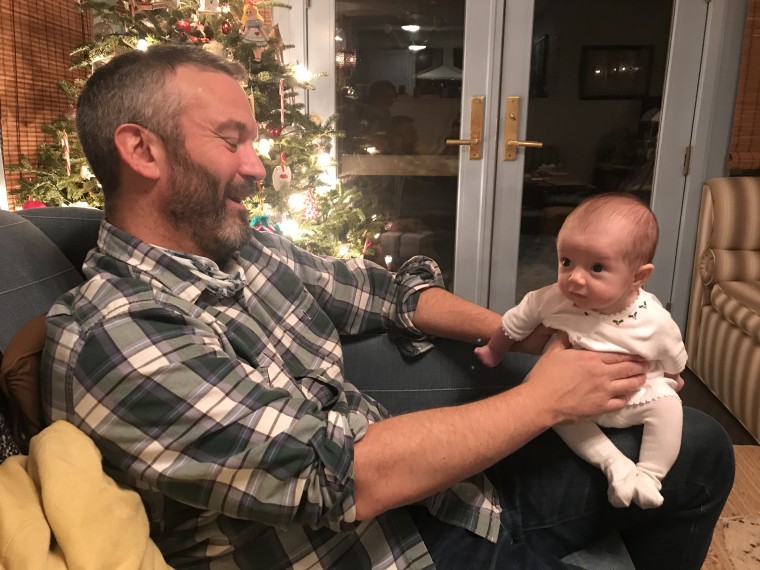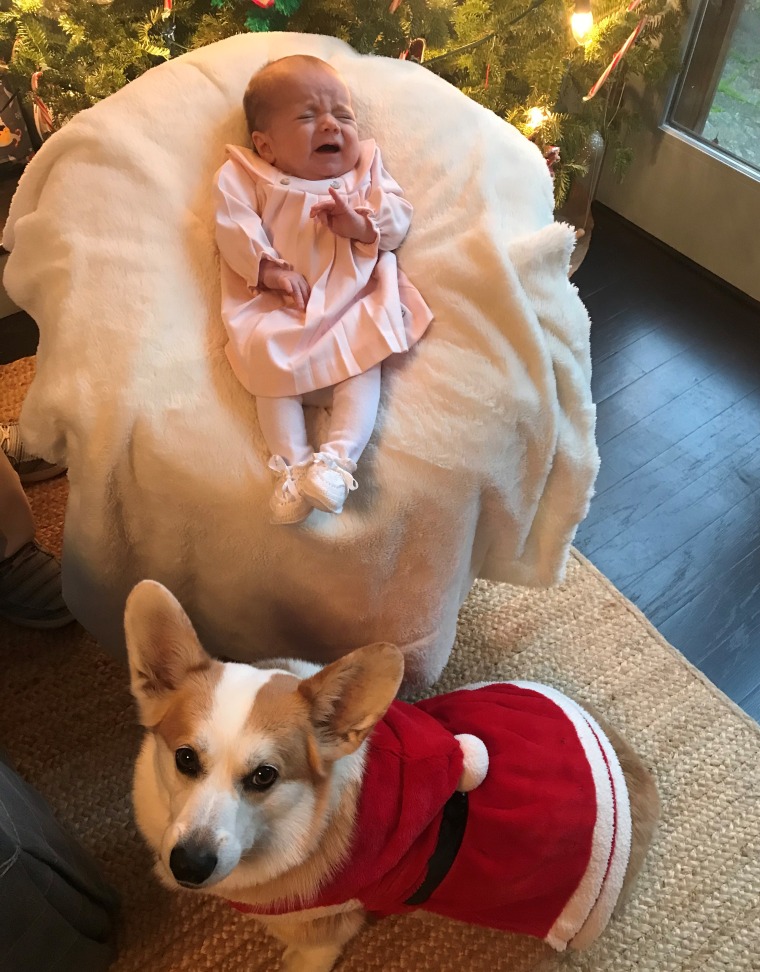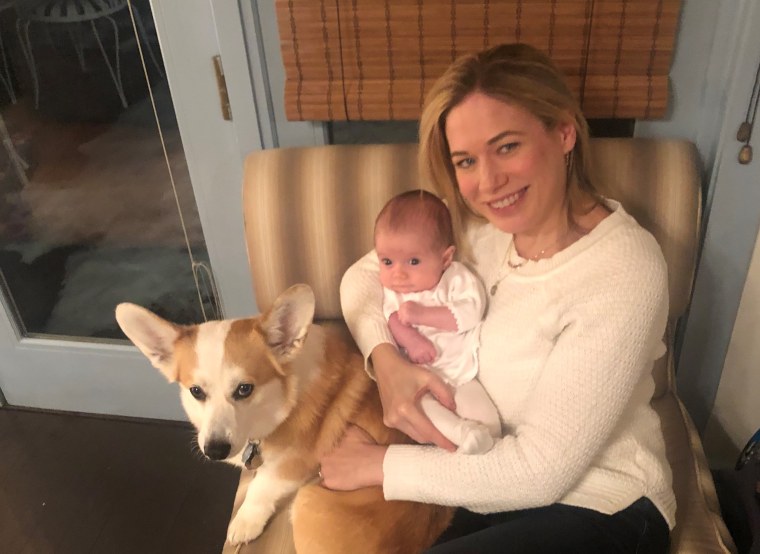Of all the days of the year, it’s fitting that MSNBC political analyst Elise Jordan was due to give birth on Election Day.
“I kind of thought like, ‘Oh, well, if I have to be in labor a long time, then I can watch election results,’” Jordan said.
But the year 2020 is not known for going according to plan. Instead, she gave birth two weeks early to her first child, daughter Mary Clyde. While Jordan is quick to acknowledge that her experience over the past 10 months has been easier than many, being pregnant and giving birth during the pandemic has its challenges — and, as Jordan sees it, its rewards.
“The pandemic has been good for nurturing patience, considering I’m a really impatient person normally,” Jordan said. “This time has been all about bracing yourself for what you can change and what you can't change, which is quite a lot.”

She never could have expected how the year would go back in March, before the reality of the virus’s dangers gripped the country. Newly pregnant, Jordan asked her doctor if she and her husband should still go on a family ski trip in Colorado.
“People were talking about the pandemic, but it hadn't really hit yet,” Jordan remembered. “And [the doctor] said, ‘Well, you can go to Colorado. It'll be the last trip you're going to take for a long, long time.’”
Sure enough, that happy stretch in the beginning of March marked the last time Jordan saw her Mississippi family, along with her last restaurant meal and her last trip to 30 Rock, the site from which she frequently appeared on-air on MSNBC and NBC. Like many, she’s now working from home, frequently doing TV appearances and writing a history of women during World War II.
“It was scary, just all the unknowns,” Jordan remembered about living in New York City in the spring, when coronavirus cases spiked. “They didn't really know the effects of Covid-19 on a developing baby.” She and her husband and their dog left their Tribeca apartment to hunker down in their Sag Harbor home three hours east. By the time she gave birth in mid-October, she was grateful for a relative lull in case rates. But that outlook was tested when she went to the hospital where Mary Clyde would be born a day before a C-section, which had been scheduled after Jordan found out she had placenta previa.
“The day before I went in for surgery, we had to go to the Covid-19 tent at Mount Sinai and get tested. And so, you're in this long line in the rain with people, some people who are getting tested like you for surgery, some people who are really, really sick and you can just see how sick they are,” Jordan said. “I was thinking, ‘I've been so careful this entire pandemic and super isolated and please, I don't want to get coronavirus today before I give birth.’”
Her husband was a calming presence at an anxiety-inducing time, pointing out that the medical professionals at the hospital had had months to figure out the best way to test incoming patients.

It wasn’t the only time her husband proved to be “the best patient advocate” in the hospital setting. They were both aware that placenta previa put Jordan at risk for complications during labor. An hour and a half into the C-section, she said aloud that she could feel the doctors operating on her.
“‘You know, I think I feel something,’” she remembered saying, “and my husband's like, ‘If she says she feels something... she's too polite and very southern and give her more, whatever drugs, right now.’”
By October, there was no dispute over whether a woman would be permitted to have someone in the delivery room with her for support during childbirth. But for a short time in March, two major hospitals banned partners from being present amid a worsening Covid-19 outbreak in the city. After an outcry from expectant mothers and patients’ rights advocates, the governor’s office issued an executive order requiring all hospitals in New York to allow women to have a partner in the room with them during labor and delivery.
“I didn't realize the enormity of not having your person with you until I was actually in the room,” Jordan said. “Obviously, you know in the abstract that you want to have your significant other there with you. But then day-of… you want to have that person, your biggest cheerleader and champion, there with you.”
Jordan and her husband are figuring out the ins and outs of new parenthood with the help of a baby nurse who’s living with them during Mary Clyde’s first months of life, a woman whom Jordan likens to a “surrogate grandmother” for Mary Clyde. Meanwhile, their 8-year-old Corgi, Bobby Sneakers, is figuring out what it’s like to share the house with a new baby.

“His station in life is perhaps a little diminished in the hierarchy of the household,” Jordan admitted. While Bobby Sneakers has clearly taken a liking to his new baby sister, he doesn't appreciate everything about her presence. “He just gets annoyed when she's crying at night and just gives me these looks like ‘why is she doing this?’ And so, it's funny that you know, the loudest little dog who barks constantly thinks he's the only one that's supposed to make noise, but now he's got another noise maker to contend with.”
While Jordan anticipated the joyful spirit her daughter would bring to these fall and winter months, she's especially grateful for the unexpected sense of hope her daughter's birth has instilled in her during these trying times.
"Giving birth during a pandemic, in this time of a lot of hopelessness, you're bringing light," she said. "And it's the most incredible expression of hope that there is, in belief in the future and belief in all the goodness and promise that there is in the world. So I do feel lucky that in this time of a lot of depressing news and hopelessness, you see this incredible life that brings so much joy to us immediately. And you can just see the promise of the world unveiled a bit."
